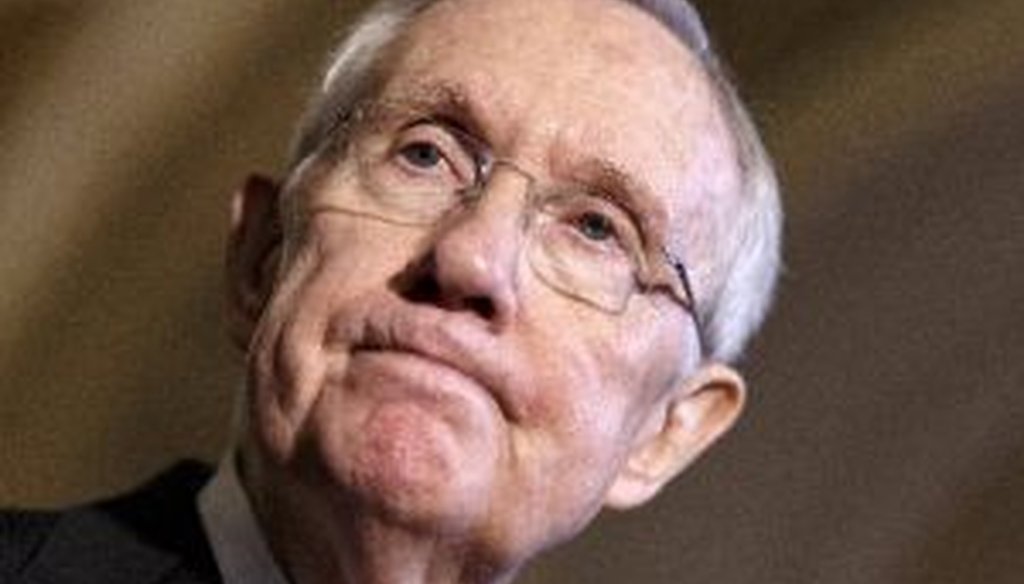Stand up for the facts!
Our only agenda is to publish the truth so you can be an informed participant in democracy.
We need your help.
I would like to contribute

Fox News host Chris Wallace accused Senate Majority Leader Harry Reid of blocking any vote on the Keystone XL pipeline.
Senate Democrats’ decision to hold a vote this week on approval of the Keystone XL pipeline stoked a new round of discussions about the controversial project on the Sunday news shows.
The $8 billion project shuffling a heavy crude oil mixture from Western Canada to Steele City, Neb., has long been on hold pending a review by President Barack Obama and the State Department, which must determine if it "serves the national interest" because it crosses an international border. The pipeline would connect with an existing southern leg that opened in early 2014, delivering more than 800,000 barrels of oil to refineries on the Gulf Coast.
First topic, jobs.
On ABC’s This Week, host Martha Raddatz quizzed TransCanada CEO Russ Girling about the economic impacts of constructing the 1,179-mile-long pipeline.
"The State Department says that once the proposed project enters service, operations will require 50 total employees in the U.S.," Raddatz said.
Sign up for PolitiFact texts
"The State Department report details every type of job," responded Girling. "And yes, the actual operating jobs are about 50, but that doesn’t include all of the other jobs that come with it. As I said, the State Department report concludes about 42,000 jobs including all the direct and indirect jobs."
"For about two years," Raddatz said, referring to the period that construction would be ongoing.
"No," Girling said. "The 42,000 jobs is in ongoing, enduring jobs."
Girling has that wrong. His claim rates False.
The State Department did conclude that "a total of 42,100 jobs throughout the United States would be supported by construction of the proposed project."
But more than 99 percent would be temporary, lasting only as long as construction -- between one and two years.
Construction would require around 10,400 seasonal workers for stretches that would last either four or eight months. This works out to 3,900 "average annual" jobs over one year of construction, or 1,950 jobs each year if the project takes two years to finish.
Another 26,100 indirect and induced jobs "would be supported by construction of the proposed project" during the construction phase. The jobs would be in providing the supply chain to Keystone as well as employee spending on lodging, food, entertainment, health care, etc.
After construction, the pipeline would employ about 50 people, primarily for maintenance.
A TransCanada spokesman told us that Girling "crossed himself" as he described the project’s benefits for the economy, and that the 42,000 jobs are just during the two-year construction period.
"The point here is many seem to denigrate construction jobs as not meaning much since they are simply ‘part time,’ " said spokesman James Millar, highlighting the thousands of workers TransCanada paid to build the Keystone pipeline’s base in 2010 and southern leg that opened in January 2014. "This is the way the profession works."
Another popular talking point on the Sunday shows centered around the timing of the Keystone XL vote. Fox News Sunday host Chris Wallace suggested the idea is to help incumbent Democrat Sen. Mary Landrieu of Louisiana, who faces a runoff election against Rep. Bill Cassidy, R-La., next month.
During an interview with Sen. John Thune, R-S.D., Wallace claimed that "the Democratic leader in the Senate, Harry Reid, has blocked any vote on the Keystone pipeline for years."
That claim rates Half True.
Reid has allowed some votes related to approving the Keystone XL pipeline, but the votes were either non-binding or an amendment tacked onto other legislation. In May and again in the summer, Reid said he would allow a standalone Keystone pipeline vote if the Senate approved energy efficiency legislation sponsored by Sen. Jeanne Shaheen, D-N.H., and Sen. Rob Portman, R-Ohio.
But Senate Minority Leader Mitch McConnell, R-Ky., and Republicans rejected the offers. Reid had blocked several Republican amendments to the Shaheen bill, so in a sort of protest vote against Reid, Republicans said no to the deal, killed the Shaheen bill and lost an opportunity to vote on Keystone.
For example, in March 2012, the Senate voted on a Keystone approval amendment, sponsored by Sen. John Hoeven, R-N.D. The measure failed, even with some Democrats voting alongside Republicans.
In March 2013, the Senate passed a similar Hoeven amendment, 62-37, approving the Keystone pipeline. But the amendment was non-binding -- and thus largely symbolic. The amendment was attached to a Senate budget resolution, which Reid does not have the ability to block.
There have been five standalone bills in the Senate seeking Keystone approval, one introduced by Landrieu and four introduced by Hoeven. None have come up for a vote.
Our Sources
See individual fact-checks.
















































